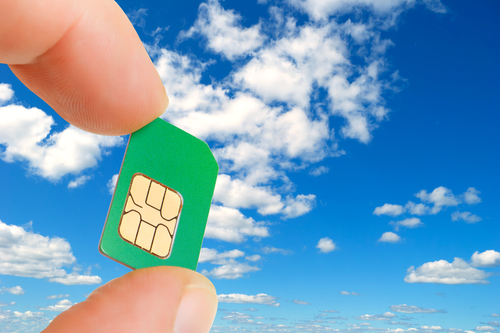July 23rd, 2013

We all have mobile phones. In fact, an often quoted statistic floating around the web claims more people have cell phones than have toothbrushes. Whether or not you believe that, you have to believe that hackers view phones as a juicy target.
You may not realize that it’s your SIM card that could be most vulnerable. That tiny little card usually found parked next to your battery gives away a lot of information. Jeremy Kirk, of PC World, reports that their are 7-billion SIM cards currently in use worldwide and many still use a weak form of encryption capable of being broken in mere minutes.
You may still be wondering exactly how outdated encryption from your SIM card results in your data being stolen. Let’s say a cyber criminal sends a piece of code, which can be anything but in this case we’ll call it a malicious software update, over SMS to your phone. Your phone rejects that code because it wasn’t authenticated by a trusted source. However, your SIM card responds with an error message carrying it’s encrypted key. Once that encryption is broken, the cyber criminal has the key and can send any malicious software they want to your phone and your device will accept them as coming from a trusted source.
SIM cards were thought by many to be the final piece of unhackable tech in your phone. These new revelations reveal that new security measures are needed to protect you from evolving cyber crime tactics. In order to keep your phone secure and your data safe, contact Geek Rescue at 918-369-4335. We use the latest security software and measures to keep criminals out of your private data.
July 22nd, 2013

Nearly every day, we hear about another catastrophic leak of data suffered by some of the world’s top companies. Either information vital to the way the company does business is intercepted, or customer’s personal identifiable information is. Both are crippling to the success of the company.
You need to take precautions in order to be as protected as possible against these devastating attacks. At the Up and Running blog, Emily Green has some suggestions for how to protect your company’s most important information.
- Change Your Passwords– You shouldn’t wait until your system is hacked to decide your passwords need to be strengthened. Make sure your passwords are as strong as possible and change them regularly to something equally strong. Changing user names is a good practice as well.
- Learn About Your ISP– When choosing an internet service provider, you may only consider the price and the speed of your connection. Your ISP should provide an extra measure of security, however, and if it doesn’t, it’s time to find a new one.
- Utilize Antivirus Software– Quality antivirus software keeps out viruses, malware, spyware and protects email from spam and phishing attacks. It also provides a firewall to further protect you. It is only effective, however, if you keep it updated.
- Use Encryption– Whatever data your company keeps, someone may find it valuable. Keeping it encrypted ensures that even if your network is compromised, your important data is still safe.
- Block Sites– Many times, the biggest threat to your security is your own employees. Unfortunately, human error results in most of the virus, malware and spam infections. Blocking potentially dangerous sites erases these possibilities.
To get the most protected, secure network available, contact Geek Rescue at 918-369-4335. We tailor a security infrastructure to your business and help keep your software updated and ready. Ask about our exclusive Safety Net service for the best in security solutions.
July 17th, 2013

Free WiFi is available everywhere, which is great to keep you and your devices connected to a high-speed internet connection. Those free networks, though, are notoriously lacking in security and provide opportunities for cyber criminals to take advantage of you. David Gorodyansky highlights some reasons for concern when using free WiFi while traveling this summer for Forbes, but his advice rings true even if you are just hanging around your hometown.
Do you have security software installed on your home computer? Chances are you wouldn’t think of surfing the internet at home without some sort of antivirus protection at least. Now, do you have similar software on your phone? For most people, the thought of protecting their smartphone has never entered their mind. Those same people use their phone to not only surf the web, but also to book reservations, make purchases and check their bank account. One could easily argue that your phone should be even more secure than your home computer.
Mobile devices are also often lost or stolen, which gives the thief immediate access to all the information you’ve accessed with that device. Phones have lock screens and apps to prevent access to your personal data and similar preventative measures are available for laptops and tablets.
For the specific problem of using unsecured mobile hotspots, there are encryption services to make your personal experience safe. By utilizing one of these services, you are free to take advantage of free WiFi but won’t be sacrificing security. Even with provisions in place, however, it’s a good idea to take some precautions. Encryption and other protections make it very unlikely for outsiders to steal your information, but not giving out personal information makes it completely impossible. If possible, refrain from making purchases or reservations with your credit card on your phone’s browser. Those can usually wait until you’re in the most secure environment possible.
To secure your mobile devices and to learn more about encryption services, like VPNs, contact Geek Rescue at 918-369-4335. They’ll not only make sure you have the most up-to-date security software, but also teach you about safe surfing habits.
July 12th, 2013

To many people, being invisible and undetectable on the internet is only necessary for criminals who are partaking in illegal activities. Those people overlook how easy it is for websites and other users to monitor your activity and steal your information. Fortunately, there are plenty of ways to stay safe by going invisible. Chris Gayomali touched on a handful of your options in his recent article for The Week.
Masking your IP address makes it more difficult to track your online activity, which is a particularly valuable skill considering the recent developments with the NSA. Your IP, or internet protocol, address is a set of numbers assigned to your device. Computers, phones, even printers, all have an IP address. To mask your IP, your connection to the internet is rerouted through other machines, which makes it hard to pin down where you actually are. There are programs readily available for download to help with this task, although some websites may not support your masked IP experience. Geek Rescue will outfit your computer with top-of-the-line software to mask your IP and keep you safer online.
Have you ever heard of a VPN? It stands for Virtual Private Network and they supply encrypted tunnels to keep your online activity secure. Again, there are plenty of downloadable tools to help you set-up your own VPN. They come in handy when using free WiFi, which are by definition unsecure networks and attract shady characters. To set up your own VPN, call Geek Rescue or stop by. They’ll have you surfing securely in no time.
You may not be using your email for any illegal activity, but that doesn’t mean you want anyone to have access to your message content. Addresses, phone numbers, bank account numbers and social security numbers are routinely included in emails. Encryption services are readily available and many don’t even require registration. Geek Rescue has the email solutions you need to ensure that no outside sources have access to your private messages.
Google, Microsoft and Yahoo have all been accused of sending information to the government. What do you do if you don’t records of your searches forward to official agencies? A little research can help you discover a new search engine that promises not to track or store records of your searches. Predictably, traffic on these search engines has risen steadily in the past few weeks.
Finally, if the search giants’ sites aren’t safe, neither are their chat clients. Encrypted chat services are often as easy as adding a plug-in to your browser. It may not be quite as convenient as Gchat, but you can be sure that no one else is reading your conversation.
For more information on how to surf safely and keep your computer and data private and secure, talk to the experts at Geek Rescue today. Give us a call at 918-369-4335.














